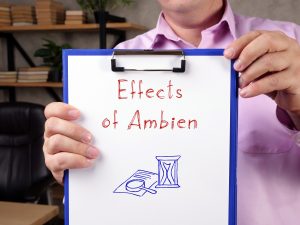Ambien, the brand name for zolpidem, is a sedative-hypnotic medication commonly prescribed for the short-term treatment of insomnia.
Unlike benzodiazepines, Ambien belongs to a class of drugs known as “Z-drugs,” which also includes zaleplon (Sonata) and eszopiclone (Lunesta). While Ambien can be effective in helping people fall asleep, it carries risks, including dependence, unusual sleep behaviors, and potentially dangerous withdrawal symptoms. This post will explore what Ambien is, how it works, its potential dangers, and the importance of seeking help for Ambien misuse.
What is Ambien?
Ambien (zolpidem) is a non-benzodiazepine hypnotic that works by affecting certain chemicals in the brain that may be unbalanced in people with sleep problems. It enhances the effects of the neurotransmitter GABA, similar to benzodiazepines, but with a more targeted action on sleep-inducing receptors. This results in a sedative effect, helping individuals fall asleep faster and stay asleep longer. [1]
Medical Uses of Ambien:
Ambien is primarily prescribed for the short-term treatment of insomnia, characterized by difficulty falling asleep, staying asleep, or both. It is generally recommended for use for no more than a few weeks due to its potential for dependence and other side effects. [2]
Side Effects of Ambien:
Even when taken as prescribed, Ambien can cause side effects, including:
- Drowsiness and daytime sleepiness
- Dizziness
- Headache
- Nausea and vomiting
- Diarrhea
- Loss of coordination
- Memory problems
- “Sleep-driving” and other complex sleep behaviors (see below)
Complex Sleep Behaviors:
One of the most concerning risks associated with Ambien is the potential for complex sleep behaviors. These are actions that individuals perform while asleep or not fully awake, with no memory of the event afterward. These behaviors can include:
- Sleep-driving: Driving a car while not fully awake.
- Sleep-eating: Preparing and eating food while asleep.
- Making phone calls or sending texts while asleep.
- Engaging in sexual activity while asleep.
- Sleepwalking
These behaviors can be dangerous and can lead to serious injuries or legal consequences. [3]

Effects of Ambien phrase on the page.
Ambien Dependence and Withdrawal:
While Ambien is often considered less addictive than benzodiazepines, it can still lead to dependence, especially with long-term or high-dose use.
Tolerance: The body can adapt to the presence of Ambien, requiring higher doses to achieve the same effect.
Physical Dependence: The body becomes reliant on Ambien to function normally, and abrupt discontinuation can trigger withdrawal symptoms.
Ambien withdrawal symptoms can include:
- Rebound Insomnia: Insomnia that is worse than before starting Ambien.
- Anxiety
- Restlessness and agitation
- Tremors
- Sweating
- Nausea and vomiting
- Seizures (in rare, severe cases)
Because of the potential for withdrawal symptoms, it is important to not stop taking Ambien abruptly without medical supervision. A gradual tapering of the dose under a doctor’s guidance is the safest approach.
The Dangers of Mixing Ambien with Other Substances:
Combining Ambien with other CNS depressants, such as alcohol, opioids, or benzodiazepines, is extremely dangerous. This combination can significantly increase the risk of:
- Respiratory depression (slowed or stopped breathing)
- Overdose
- Coma
- Death
Seeking Help for Ambien Misuse:
If you or someone you know is struggling with Ambien use, it’s essential to seek professional help. This may involve:
Consulting with a Doctor: Discussing your concerns and developing a safe plan to reduce or discontinue Ambien use.
Therapy: Cognitive-behavioral therapy for insomnia (CBT-I) is a highly effective treatment for insomnia that can help you develop healthy sleep habits without medication.
Medically Supervised Detox (if necessary): In cases of significant dependence, a medically supervised detox may be recommended to manage withdrawal symptoms safely.
Support Groups: 12-step and non-12-step programs and support groups provide peer support, encouragement, and a sense of community.
Conclusion:
Ambien can be an effective short-term solution for insomnia, but it’s crucial to be aware of its potential risks, including dependence, complex sleep behaviors, and withdrawal symptoms. If you’re concerned about your Ambien use, talk to your doctor about safer sleep strategies and, if necessary, a plan to discontinue the medication safely. Healthy sleep habits and non-medication approaches are often the best long-term solutions for insomnia.
If you are experiencing any problems with your Ambien use, please reach out to Gallus Detox to explore your options.
Sources:
National Institute on Drug Abuse (NIDA): Prescription CNS Depressants. (While NIDA doesn’t have a page exclusively on Ambien, this page covers the class of drugs.) https://www.drugabuse.gov/drug-topics/commonly-used-drugs-charts#prescription-cns-depressants
American Academy of Sleep Medicine (AASM): Clinical Practice Guideline for the Pharmacologic Treatment of Chronic Insomnia in Adults. (This is a professional guideline, but it provides evidence-based recommendations.)
Food and Drug Administration (FDA): FDA adds Boxed Warning for risk of serious injuries caused by sleepwalking with certain prescription insomnia medicines. https://www.fda.gov/drugs/drug-safety-and-availability/fda-adds-boxed-warning-risk-serious-injuries-caused-sleepwalking-certain-prescription-insomnia
Zolpidem: a review of its pharmacology, efficacy and tolerability in the treatment of insomnia: https://pubmed.ncbi.nlm.nih.gov/9357872/



